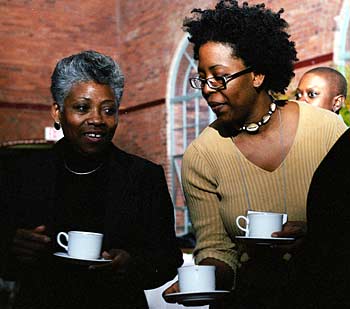Get Connected
Every three years the African-American Alumnae/i of Vassar College helps young Vassar minds connect with experienced Vassar alumnae/i by hosting an on-campus conference called Triennial. Various social mixers, entertainment events, and forums are held, and at any turn you’ll make a connection. It happened to me.
My connection began in Alumnae House and took me to Washington, DC. There, at the E. Barrett Prettyman U.S. Courthouse, I stepped onto an elevator and toward the office of Richard Roberts ’74. Roberts, a Federal Court Judge in the United States District Courts, is just one person you can connect with at Triennial. But how did he get from Vassar to presiding in our nation’s Federal Court system? What advice would he offer young Vassar minds? Below is an excerpt from the interview I conducted with him.
Maldonado You have an impressive life. Who at Vassar helped you get here?

Maldonado How does that aid you now?
Roberts When I get a case, I really have to unlock the main controversy. Meaning, “What is this case really about? What is the real problem? What is the real conflict? What is the way to bring real justice to the parties that have come before me?” Fierce and Hodges helped me look beyond the papers I see, to look to the human beings and institutions that are before me and identify what is at the nub of this controversy. It was and is about meaning and context and trying to do something in ways that have a broader context.
Maldonado What did those faculty of color give you?
Roberts The Black Studies department, to me, was like another home. When I walked in there, I’d find that smooth water, a welcoming environment, and a higher standard for me. There were others who expected that students of color weren’t able to perform and they weren’t surprised if we didn’t. Fierce and Hodges wouldn’t let you get away with mediocrity.
Maldonado How’d you go from Vassar to here?

Dean of the College J.J. Jackson and Stacey Long ’89
Roberts My first year after Vassar, I was in a graduate program that professor Hodges steered me toward in Vermont: the School for International Training. It allowed me to get a master’s degree and do an internship in East Africa. It was a capstone in my development as an African-American male. I grew up in New York City, attended Vassar College, developed a broader perspective to the experience of African Americans, then was able to experience that perspective in East Africa for a couple of months. It was invaluable. I returned to the states and enrolled in the CLEO program. (The Council in Legal Education Opportunity offered a six-week, pre-law program.) Then I attended Columbia Law School and that was quite a shift in gears. I went from living and working in Nairobi to living and attending law school in Manhattan and learning about alien things like torts, property, and civil procedure. The first year of law school is quite tough, but as tough as it was, I don’t regret having made the choice to do it. We didn’t have lawyers in my family. We had never been sued or ever sued. It was a whole different experience for me. Yet it is a continuation of my expansion.

Roberts First, don’t worry that you don’t know where your yellow-brick road is or where it is going to point you. Youth is a time where you’re able to experience and expand and learn. Put no limits on what you’re learning and experiencing—that can help you out. In due time, the yellow-brick road will be paved; it will have a direction; it will show you where you will be going. It’s really you who will be paving it, not that it will be paving you. Secondly, practice excellence because whatever yellow-brick road you end up choosing, mediocrity is not going to get you anywhere. Excellence will reward you and anybody you’re serving.
Torrey Maldonado ’96 teaches in New York. To learn more about the African-American affiliate group, visit www.aavc.vassar.edu.
Photo credit: Jim Smith
Read the full text of this interview in the online additions department of this issue.
